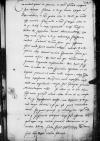List #843
Stanisław KOSTKA do Ioannes DANTISCUSMarienburg (Malbork), 1532-10-22
Rękopiśmienne podstawy źródłowe:
Pomocnicze podstawy źródłowe:
Publikacje:
| ||||||||
Tekst + aparat krytyczny + komentarzZwykły tekstTekst + komentarzTekst + aparat krytyczny
Reverendissimo in Christo Patri, Domino, domino
Commendatis prius in gratiam Vestrae Reverendissimae Paternitati exiguis suis obsequiis salutem Vestrae Reverendissimae Paternitati sincere exopto etc.
Reverendissime in Christo Pater.
Scio Vestrae Reverendissimae Paternitati recenti esse memoria florenorum mille a
Sic actum est et non aliter, quod si autem quisquam alius aliter de me et ea causa Vestrae Reverendissimae Paternitati significavit sinistri, non dignetur Vestra Reverendissima Paternitas tali iniquo delatori, si qui est, pias accommodare aures, sed potius gratiose ex intuitu meae erga eandem Vestram Reverendissimam Paternitatem praeservantiae suscipere meque suis instruere litteris, quid agere cuique eandem pecuniam annumerare et extradere debeam, sedulo faciam exhibitorique quietanciae sacrae
Ex
Eidem Vestrae Reverendissimae Paternitati deditissimus

